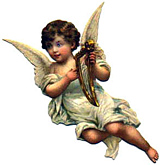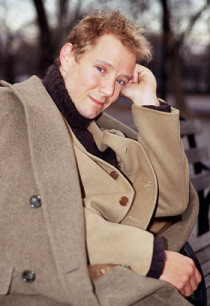Sunday June 3, 2007
___________________________________________________________
The Washington Post 6/3/07:
Mark Adamo is the fastest-rising new opera composer in the country, with back-to-back hits, a national PBS broadcast and major companies lining up to perform his work. So why is he back in Washington this week, not to wow the opera world but to premiere a decidedly non-operatic concerto for . . . the harp? "Most writing for the harp is so trite!" says the composer, echoing a sentiment widely (if quietly) shared among music lovers. "We always hear this perfumed, elegant persona for the harp. It's Sunday morning brunch -- eggs Benedict with the harp strumming in the background. And the only thing more trite than that is all those insipid Christmas-card angels with which the harp is constantly associated.
"Most writing for the harp is so trite!" says the composer, echoing a sentiment widely (if quietly) shared among music lovers. "We always hear this perfumed, elegant persona for the harp. It's Sunday morning brunch -- eggs Benedict with the harp strumming in the background. And the only thing more trite than that is all those insipid Christmas-card angels with which the harp is constantly associated.
"So I decided," he says with a laugh from his studio in Upstate New York, "to kill two cliches with one stone."
And when it premieres on Thursday, "Four Angels" may set the harp world on its delicate ear. Five years in the making, it's an unbridled ride through the empyrean, portraying angels from Christianity, Islam, Judaism and Zoroastrianism not as simpering cherubim but as wild, passionate creatures. Released from its genteel prettiness -- and armed with unusual techniques such as pedal crashes and key glissandos -- the harp soars across a heaven-scape both terrifying and sublime, wreaking havoc and transcendence as it goes.
"It's like nothing that's ever been heard on the harp before; it's going to change the way people think," says Dotian Levalier, the National Symphony's principal harpist, who commissioned the work. "When we first talked about this, I told Mark that I didn't want another delicate, tinkly piece -- I wanted something with some meat behind it. And I think I got it."

Photo by Martin GramFor Adamo, 45, the Kennedy Center premiere is a sort of debut -- it's his first concerto and his first major purely orchestral work. But it's also a homecoming. Adamo's career began in Washington when, as a composition student at Catholic University in the late 1980s, he struggled to make the rent and get his music heard.
Fortunately, he found a few angels of his own -- National Symphony Orchestra players Levalier, bassoonist Linda Harwell and Sylvia Alimena, a horn player who was then launching her now-acclaimed Eclipse Chamber Orchestra.
"I first met him when he was a waiter at the West End Cafe," says Alimena, referring to a restaurant just a few blocks from the Kennedy Center. "A bunch of us used to go there after National Symphony concerts, and we got to know him. At some point he asked us if we wouldn't mind playing one of his pieces, and I noticed how beautifully the wind parts and string parts were written. And I thought, this kid's kind of talented!"
Alimena was so impressed that she urged Adamo in the early 1990s to write a piece for her new orchestra. It was an offer that any young composer would have jumped at, but Adamo did not take it seriously at first. His real interest was musical theater, and despite being active in the local music scene -- singing in the Congressional Chorus, directing productions of light opera, and even writing music criticism for The Washington Post -- the idea of being a composer seemed almost absurd.
"I really only wanted to become overqualified as a theater songwriter -- that's why I was studying composition," he says. "Like a lot of people, I thought that unless you're Benjamin Britten and you've written five piano sonatas by the time you're 10, you're not going to be a composer."
But Alimena persisted, a deadline was set, and Adamo went to work. "I was having that year that people have, when all your friends start dying," he recalls. "I had an idea for an AIDS piece -- but to do a piece on that subject, of course, was heavy going. So I told Sylvia, 'I understand if it's not right for you.' And, God love her, she said, 'Just write what's in your heart.' "
The advice worked. "Late Victorians" -- an AIDS memorial for singer, speaker and orchestra -- premiered in 1995 to immediate critical and popular acclaim, and led to a commission from the Houston Grand Opera for a full-blown opera. Fully over his reluctance to consider himself a composer, Adamo wrote the lyrical, two-act "Little Women" (based on Louisa May Alcott's classic coming-of-age novel) and when it premiered in 1998, he joined the front ranks of American opera composers almost overnight.
The New York Times declared the opera a "masterpiece" and audiences responded to its humor, warm lyricism and fast, engaging flow. (Adamo, originally trained in theater, wrote the libretto himself.) In less than a decade, "Little Women" has been produced more than 40 times around the world, and in a rare coup for a maiden opera, was broadcast nationally in 2001 as part of the PBS "Great Performances" series.
With his career now officially meteoric, Adamo followed up with more successes -- notably the wildly funny 2005 opera "Lysistrata, or the Nude Goddess" (also written for the Houston Grand Opera). He became composer-in-residence for the New York City Opera (a post he held from 2001 to 2006), further refining a sophisticated, wide-ranging musical style that embraces everything from 12-tone modernism to Broadway show tunes, and even -- in the case of "Four Angels" -- the exotic sonorities of Chinese gongs.
That kind of eclecticism hasn't always impressed critics; Alex Ross, the classical music critic for the New Yorker, once praised his "dexterous synthesis of 20th-century techniques" while wondering if that's what the world really needs. But Adamo says that being flexible and using the vast global musical palette is the right -- maybe even the obligation -- of every contemporary composer.
"Why shouldn't I use the sound of Chinese gongs in a harp concerto?" he asks, railing against "the purity police" who demand that music fit into rigid categories.
"The history of concert music is one of almost unremitting ethnic war -- the French against the Italians, against the Germans, against . . ." He heaves a weary sigh in the direction of Europe. "But now, every nation is represented everywhere. We live in the world, rather than in one particular culture. For good or ill, it's a global village. And our challenge, artistically, is to make sense of all this incredible variety."
Adamo's now preparing a new opera for the San Francisco Opera; he won't disclose its subject yet, but says it will be "bigger and less fleet" than his previous works. He's also working on a collaboration with his partner of 12 years, composer John Corigliano, and is revising and recording many of his early works, several of which will be released on a Naxos recording next year by the Eclipse Chamber Orchestra.
As far as his angels are concerned, Adamo's rise has only just begun.
"My colleagues and I feel very strongly about Mark's music," says Alimena. "He's extremely brilliant, hysterically funny and rarely earthbound. But the important thing is that he's not afraid to sing. So many composers rely on percussion and loud noises. But Mark's not afraid to be lyrical, to show a tenderness in his writing. And I think that's why his music touches people so deeply -- and on so many levels."
The National Symphony Orchestra under Leonard Slatkin will perform Mark Adamo's Four Angels on June 7-9 at the Kennedy Center. The program also includes symphonies by Haydn and Mahler.